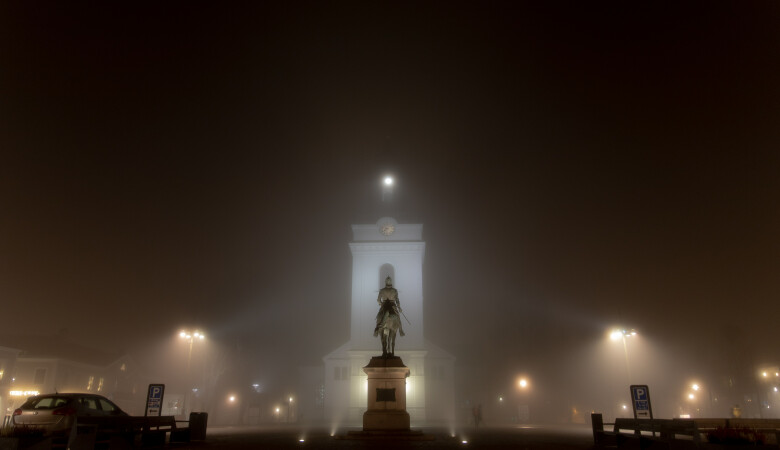The Christian and Government, Part 3 (Romans Sermon 100 of 120)
May 07, 2006 | Andy Davis
Romans 13:1-7
Government & Authority
Introduction: The Man Without a Country
I'd like to ask that you take your Bibles and look at Romans chapter 13. This is the third part of three in this series on the Christian and Government. Really, it's just one sermon in three parts. And as we come now, having understood already, the first two parts in Romans 13:1-7, we're coming to some ethical questions about how Christians relate to government.
Now, it's difficult to find a tale charged with stronger patriotism than that written by Edward Everett Hale in 1863, entitled "The man without a country." It was written at the height of the civil war and Hale's passion for the United States of America breathes in every line. The story is a compelling one about a man named Philip Nolan, who was unjustly charged with treason in 1807. And during that trial, he cried out, "Curse the United States! I wish I may never hear of the United States again."
The court was shocked, since many of those sitting in the court martial had fought and risked their lives and their possessions for the American Revolution. And so the judge icily granted Nolan's request, and exiled him to sail for the rest of his life on a series of naval vessels. The sailors having been commanded never to mention the United States to him, or give him any news of his former home country. Though defiant at first, Nolan eventually, bitterly regretted his rash words. A painful moment occurred for him when he overheard someone reading Sir Walter Scott's famous lines,
Breathes there the man with soul so dead
Who never to himself hath said
‘This is my own, my native land!’
Whose heart hath ne’er within him burned,
As home his footsteps he hath turned,
From wandering on a foreign strand
By the end of his life, Nolan was probably the strongest patriot in the history of the country. Even though he had never been permitted to hear the name of the United States again, he had an estate room, a shrine with an American flag draped around a picture of George Washington. And he said to a sailor, "For your country boy, and for that flag", as he pointed to the ship's flag, "Never dream a dream but of serving her as she bids you, though the service carries you through a thousand hells. No matter what happens to you, no matter who flatters you, or abuses you, never look at another flag. Never let a night pass by, but you pray God to bless that flag. Remember boy, that behind all these men... Behind the officers and government, and people even there is the country, herself. Your country. And that you belong to her as you belong to your own mother, stand by her boy, as you would stand by your own mother."
Now, Hales intense patriotism is reflected in people all over the world. It's the same way that German people feel about the Fatherland, and Russian people feel about Mother Russia, and Chinese people feel about what they call the Middle Kingdom and what Japanese people feel about the land of the rising sun. It's their own, their native land. And if you've ever traveled and been abroad for a long period of time, I think you can relate to what Walter Scott said... "It feels good to be home."
The Call to Look to a Better Country
But I'm calling on us as Christians today to look to a better country. To a distant country that hasn't come to us yet, to embrace the words that the Apostle Paul said in Philippians 3:20. When he said, "Our citizenship is in Heaven. And we eagerly await a savior from there, the Lord Jesus Christ."
Our citizenship is in heaven and we're waiting for the time when we will be there, and we are homesick, at least I am homesick, for a place I have never seen. I'm homesick to come home to heaven, aren't you? And in the meantime while we can embrace patriotism at one level, and our native land and it's good to be home, those feelings, I believe are just a dim reflection of something that's going to be elevated to a much higher level, when at last, we see the Savior. When at last, we come into that new heaven and that new earth which is the home of righteousness.
And so understanding our relationship to our own, our native land, begins with properly understanding our status as aliens and strangers in this world... That we are just passing through. It starts even above that with understanding what it means that "Jesus is our king". He is ultimately our government.
It starts were living a life of faith that sees a future country. A better one, a heavenly one, as it says in Hebrews 11:13-16, of the faith-filled people. It says there, "All these people were still living by faith when they died. They did not receive the things promised, they only saw them and welcomed them from a distance, and they admitted that they were aliens and strangers on earth. People who say such things, show that they're looking for a country of their own, a heavenly one. Now, if they had been thinking about the country they had left, they would have had opportunity to return. Instead, they are longing for a better country, a heavenly one, and therefore God is not ashamed to be called their God for he has prepared a city for them." The city of God, my friend... A better and heavenly country.
We are citizens of that if we're Christians. And what's so beautiful is that's true of people all over the world, from every tribe, and language, and people, and nation. One of the greatest evidences of the truth of our faith is, you can sit in an airport and find a man from Nigeria, or a woman from China, or a child even from Germany, and you can talk to them if you can get past the language issue. You can talk to them, and if they're Christians, you will have more in common with those people than you will with non-Christians from America, because that is our true home country.
I. Government in the Bible: Review of Basic Principles
Now, we've looked at Romans 13. And I just want to review what we've already learned about government, human government. We've seen that God is Lord of Heaven and Earth. He rules over all things, but that he delegates some of his sovereign power, his authority, he delegates to created beings. And he's going to judge those creative beings, governors, kings, rulers for what they do with their power, and he's going to judge those who are under their authority, about what they did with the relationship, as well.
We've also seen that although God has delegated his power, it doesn't mean he has released his sovereign control of the ebbs and flows of history. But God actively rules over the rise and fall of nations. We've seen that good government, as reflected in Romans 13, is a blessing from God. We've also touched on the fact that bad government, as revealed I think in Revelation 13, is a curse from the devil. And therein lies the problem. The pure and high picture of government in Romans 13 is not always the case. Seems to me that God has put human government... In history, he's put human government on display. And even the best governments have been tainted by human sin, have they not? And then there are the horrendous governments that have been openly embracing human sin. And so we've had our chance to rule, and Utopia has never come.
There's never been a perfect society in this world, but there will be some day when Jesus rules. Amen? And we're yearning for that day and looking forward to it. So we've seen that, and from these basic principles, we have two commands coming from Romans 13, one through seven. First, we are to submit to the governing authorities. And we saw that submission is a glad humbling of oneself below a God-ordained authority, for the sake of God and for his glory. We talked about that.
We've also talked about the need and the command that Paul gives to give to government, whatever we owe. Whether taxes or honor, respect, those things that are listed in Romans 13, we've already seen that.
II. Six Key Ethical Questions
Now, we began last week to look at some ethical questions that flow from Romans 13. Six ethical questions. Now, my purpose this week is to survey the terrain of the rest of these questions. That's right, to survey the terrain of the rest of these questions. Not finally to answer them. You all have the expectation to get out of here at a reasonable amount of time. Am I right? Okay. And we've got five more of these questions, and if I were to give suitable time to each one, we would be here for hours and hours. Books have been written about these things. What I want to do is, I want to lift up some of the main issues that come connected with these ethical questions, and try to show you how Christians have thought on both sides of some of these issues over the time. I'm trying to refrain from giving my own opinion on these matters. I'll try to share with you what I think as a Christian, but I tell you this... My word will not be the final word on these questions.
What I do want you to do is, I want you to understand how Christians have discussed these things. I want you to have respect for other Christians who disagree, and I'd like the discussions to continue. We live in a time when this country is at war. And these issues are majorly on people's thoughts and minds right now. The issue of the patriotism and of our responsibility to human government.
1) Limits to Obedience: Is submission to government absolute or are there limitations?
Now last week, we saw limits to human submission to government. We asked the question, is submission to government absolute or are there limitations? We answered yes, there are limitations. We saw the example of Peter and John, having been commanded by the Sanhedrin, not to speak or teach it all in the name of Jesus. This ran on direct contradiction to the Great Commission of Jesus Christ. And so, the answer very clearly, "Judge for yourselves whether it is right in God's sight to obey you, rather than God. We cannot help speaking about what we have seen and heard." Now that's a key issue. When it comes down to this, judging for ourselves whether it's right to obey a human government rather than God, that word "rather" is key. And when we are brought to a place where we must choose, we must choose to obey God, and we saw therefore that our obedience to human government is limited.
2) Christians and War: Should a Christian fight for secular governments?
Now, let's look at this question of Christians and war. The question is, should a Christian fight for secular government? I want to bring before you two opposite case studies that have been in my mind over the last two weeks. Imagine, case study number one... You come upon a situation in which an innocent man is being bludgeoned to death along the road by some muggers. In effect, you've come on the scenario Jesus describes in the parable of the Good Samaritan. Only, he's not already lying by the side of the road bleeding, the mugging is actually going on. The question you have to ask is, "How could you rescue that helpless victim from the situation without using force?" And if you can't rescue the person without using force, are you obligated or allowed to use force to rescue him? And if the answer to that question is "yes," you're on the road to what we call a "just war approach." That Christians are obligated, in some cases, some will answer, or allowed to use force to rescue the innocent from human government.
Let me give you an opposite case. Imagine that you came upon two Christians who are arguing bitterly, and you knew them well and it seemed like they're very upset with each other. Would you make any effort to be a peacemaker in that situation? I would hope to think you would. You would make an effort to be a peacemaker. Suppose while it's going on, they got even more aggressive and started pulling out weapons and wanted to kill each other. Would your desire to be a peacemaker increase or decrease in that situation? Well, I would think it would increase except you have one thought, and that's you'd like to get out of it alive. But you would desire to bring peace between the two Christian brothers, who seem to have lost all perspective. And now want to kill each other. I assure you, Jesus did not have this in mind at the time of the foot-washing.
Is it okay, though if they're wearing uniforms of opposing countries during a time of war? Can you have one spirit-filled Christian sighting along a sniper rifle at another spirit-filled Christian also sighting along a rifle at you, at each other. Is this even possible? This is a logical absurdity. Is one of those two Christians failing to hear God correctly? And if you answer yes, you're along the road to pacifism. Herein lies the problem... Should Christians be involved in war? Now in World War I, this scenario that I described to you actually happened. There was a time in which British Christians and German Christians met in no man's land and celebrated Christmas.
And so they had a little celebration under a flag of truce, and they enjoyed that time of worship together, and the next day they went back to fighting again. What a strange scenario. How do we explain that? Are one or both of them hearing God wrongly?
Absurdity number one: The Good Samaritan stands idly by, waiting for the mugger to finish his work, so that he can begin his work of mercy. That's strange. Absurdity number two: The Spirit helping one Christian to kill another Christian while the same spirit is helping the other Christian to kill the first. That's an absurdity, and herein lies the problem... We're dealing with the tangled mess and irrationality of sin. And it leaves Christians literally not knowing what to do.
Three Different Positions: Activism, Pacifism, Selectivism
Now, there have been, in church history, three different views on this question. First, there's the view of activism. Basically, it's my country right or wrong. If the country says go to war, you need to go. Regardless of what you think about the cause, you go. That's called activism. Then there's pacifism, that basically a Christian should never be involved in war, for New Testament principles. Usually the arguments are made from the Sermon on the Mount, saying, We should not resist an evil person. If someone strikes you on the right cheek, you should turn the other also. And then there's thirdly the view called selective-ism, the idea that Christians should get involved in the right wars for the right reasons, but not in the others. This is what you call The "just war" theory.
Now, in the Old Testament, there's ample evidence that war and the involvement of the people of God in war, is not in itself evil. In Genesis 14, Abraham gets 318 of his trained men and rescues his nephew Lot in the war of the seven kings, king of Sodom, and all those others, you can read about it, that's the first war described, and Abraham is right in the middle of it. God clearly commands Israel to participate in war as an agent of his wrath during the time of Joshua, when they took over the land of Canaan and drove out seven nations and destroyed them. God actually judges King Saul for not finishing the conquest of the Amalekites by leaving King Agag alive, and Samuel kills him and it's clearly in the text, pleasing to God that Samuel did it and displeasing that Saul didn't do it.
God blesses David for killing Goliath who was defying the armies of the living God. And David celebrates God's training of his hands for war in Psalm 144, verse one. It says, "Praise be to the Lord, my rock who trains my hands for war and my fingers for battle." Nehemiah rebuilds the wall of Jerusalem with the sword in one hand and the trowel in the other. God blesses Israel by defeating their enemies again and again, in answer to prayer or with the courageous actions of godly men. From this, it is clear that the Old Testament at least, does not call participation by the people of God in war itself and evil or wicked thing.
Now in the New Testament, nowhere is this basic idea openly contradicted. There are no commands anywhere for Christians not to be involved in warfare. John the Baptist, when speaking to soldiers... Soldiers come to John the Baptist and say, "What should we do?" he doesn't say, "Resign in position... Stop being a soldier", but he urges him to act morally and with integrity, as soldiers. Jesus himself uses a military analogy, about counting the cost. If you want to become a Christian, you have to count the cost and he says in Luke 14, "Suppose a king is about to go to war against another king, will he not first sit down and consider whether he is able with 10,000 men to oppose the one coming against him with 20,000?" Jesus doesn't there say that the enterprise of war is evil or wicked, he shouldn't be doing that, what he's saying is he shouldn't do it, if he's going to lose.
And he should figure out whether he's going to lose and if he can't, he's going to sue for peace. And so also, you should decide ahead of time if you've got the commitment that it takes to follow Christ right to the end of your life. At the end of the Book of Revelation at the end of the world, Christ is portrayed as riding at the head of the armies of heaven, who are clothed in white linen and his robe is dipped in blood, and on him is written, "King of Kings and Lord of Lords", and he comes conquering.
Hebrews 11, the faith chapter, celebrates... Again, this is in the New Testament, giving these examples of faith... Celebrates Old Testament warriors. This is Hebrews 11:32-34. It says, "What more shall I say? I do not have time to tell about Gideon, Barak, Sampson, Jephthah, David, Samuel, all of those were involved in warfare. They're all listed together. And the prophets, who through faith conquered kingdoms, administered justice, gained what was promised, shut the mouths of lions, quenched the fury of the flames, escaped the edge of the sword, whose weakness was turned to strength, and who became powerful in battle and routed foreign armies."
This is right in the New Testament a display of faith. The Apostle Paul uses a military analogy for the Christian life, being like the life of a soldier. He said in 2Timothy 2, "Endure hardship with us as a good soldier of Christ Jesus. No one serving as a soldier gets involved in civilian affairs. He wants to please his commanding officer." And so there's that military analogy. However, there are some key changes as well, in the New Testament. Christ example as the Prince of Peace, he lived out the turn-the-other-cheek mentality. When he was about to be arrested in the garden, and Peter wanted to use the sword to deliver him from that, he said, "Put your sword away for all who draw the sword will die by the sword." And then he said, "Do you think I cannot call on my Father and he would at once put at my disposal more than 12 legions of angels? But how then would the Scripture be fulfilled that say it must happen this way?" he chose not to. Clearly, he had the power to do it but chose not to.
And even more significantly, is Christ's statement to Pontius Pilate, when he said, "So you are a king?" And he said, "My kingdom is not of this world. If it were, my servants would fight to prevent my arrest from the Jews. As it is, my Kingdom is from another place." Therefore, Jesus said his kingdom's different than any other kingdom that's ever been. Those kingdoms advanced by conquest, military conquest. His kingdom advances differently, and you find out from his teaching and from church history, Christ's kingdom, his true kingdom advances, not by killing, but by being willing to die. By taking up the cross. Daily in following Jesus.
Christ commands on the Sermon of Mount have already been listed not to resist an evil person, to turn the other cheek. Paul makes a statement that our warfare is not earthly warfare, but heavenly. He says, "For though we live in the world, we do not wage war as the world does. The weapons we fight with are not the weapons of this world. On the contrary, they have divine power to demolish strongholds. We demolish arguments and every pretension that sets itself up against the knowledge of God and we're ready to take captive every thought to make it obedient to Christ." He says openly in Ephesians six, "Our struggle is not against flesh and blood, but against the rulers, against the authorities, against the powers of this dark world."
And then there's the issue of the worldwide advance of the Gospel of Jesus Christ. In the Old Testament, basically it was clearly an us versus them situation. If they're across that stretch of land, they are bad people who don't know anything about the living God. Very clear, the Philistines or whatever. But in the New Testament era, the Gospel is commanded to be preached to every creature under Heaven. That Jesus is making a claim on every nation and that the Gospel must be preached to every tribe and language and people and nation. That command, brothers and sisters, was not given last week. For 2000 years the gospel has been permeating the world. There is no political nation on earth where there are not churches worshipping Jesus Christ. And therefore it's not so clear anymore who's across that space. We don't know who's over there. And therefore that absurdity that I talk to you about actually has happened again and again. Not just in World War I, but in the Civil War and in other wars. Most European Wars that was very much the issue.
C.S. Lewis
Now C.S. Lewis in 1941 published a strong tract on the issue of Christians involvement in war. He said that the Christian faith has made two great contributions to the issue of war and participation in war. First, pacifism, and second chivalry. Pacifism, he says, is an honest theological mistake. Now, he's writing, having been a soldier in World War I and it was in the height of the struggle between Great Britain and Germany, Nazi Germany at the time. He says that pacifism is an honest mistake and he says so because it's leaving the dirty work to others, that's the way he argued.
Instead he argues for chivalry. Now what is chivalry? You might think of Sir Galahad or Sir Lancelot or something like that. The formation of a chivalrous knight who's going to fight what we call the just war in the just way. And so the chivalrous knight is going to learn how to display extreme fierceness and extreme meekness and will have extreme wisdom to know when to do either one. And so he argues for chivalry. The just war fought in the just way.
Now, I say to you, first of all, only a just society can produce a just warrior. Only the church ultimately can produce somebody who could fight a just war in just a way. If it's to be done at all, it has to be done by the church. This would include soldiers being willing to not get involved in a war because it's unjust or if they're in a just war, disobeying an unjust command in the middle of that. Being willing to be court martialed. Say, "I will not bomb a civilian target, I will not gun down those POWs? I will not violate the principles of chivalry." Well, then you're going to be court martialed. They would actually welcome it because in this way they could be salt and light in their own society and prevent their society from becoming corrupt as any pagan nation might. Thus the chivalrous soldier is willing to lay down his life in a different sense so that his society will not become corrupt.
Now my strongest argument for Christian involvement in warfare is the need for Christians to be precisely that. Salt and light to prevent immoral decisions and actions and war. Without Christians acting as Salt to retire the spread of corruption, the gung-ho blind patriotism of some Marines or bomber pilots or rangers or Navy Seals or covert operatives coupled with their overwhelming weapon systems and their natural violence and their pride and their desire to use those weapon systems, will bubble over into wickedness. Only if there are Christians they are to retard it, will a conscience be maintained in the Army, the Navy, Air Force and the Marines. My strongest argument for Christians not being involved in warfare is the ever-increasing complexity of the modern scene. Urban fighting against non-uniform terrorists who use women and children as shields or even participants, makes fighting with chivalry very difficult.
So you're saying, "What's the answer?" Well, I didn't tell you I was going to give you an answer. I respect pacifism, but I think in the end the Christian is called to fight for the helpless who can't fight for himself. He's called to defend his wife and his children, he's called to defend. In the end I think this is right. Just war. I'm just saying it's getting harder and harder and harder.
3) Limits to Opposition: Is armed opposition to government ever permissible?
Now what about the questions of limit to opposition? Is armed opposition to government ever permissible? Now we've already seen that Christians must disobey evil commands given by their government. That's already clear. But here we're arguing something else. Should we go beyond disobeying evil commands given by a government to organizing ourselves militarily to try to topple what we perceived to be an evil government?
That's a different question. And what bothers me is, any arguments or defense of revolution tend to start with an individual case like the Hebrew Midwives or Shadrach, Meshach and Abednego or Peter and John in front of the Sanhedrin. And argue from that to complete revolution, overturning of the government. You can't draw that. The Hebrew Midwives continued submissive to Pharaoh, Shadrach, Meshach and Abednego continued submissive to Nebuchadnezzar. So did Daniel submissive to King Darius. And Peter and John as they could be submissive to the Sanhedrin.
So you're saying, "Well, what about the American Revolution? It may be on your mind. Our country was started by people who felt it right to overthrow the power and authority of King George. I've had numerous people come to me over the last two weeks, say, "What are you going to say about the American Revolution?" Well, we're just about out of time here actually as we're moving along and...
I said at one point, it's not looking too good for the American Revolution at this point. I will say this, there was a saturation of pastors and religious leaders who were in the forefront of the revolutionary movement. And who made strong and elaborate arguments. And they understood English law and the relationship between the king and Parliament and the people better than I do. There are limits even for pastors on how much we want to study Political Science. Okay? So as I read, I say, "I can see the arguments." They basically said that the government had been set up so that the king's power was in check by the Parliament and he didn't have absolute authority. 1688, the Glorious Revolution, set that up. So the Parliament was strong. And thus they were making this argument, no taxation without representation, saying basically the king had broken the Covenant.
But does that argue that the King should therefore be toppled and no longer have authority? That's a big leap. It's a leap I'm not able to make, but others are and I can respect them for that. And I also think that God can bless something that isn't born according to his will, but then after that flourishes in a wonderful way. But others disagree and say, "No, they were... " They can make a very strong and elaborate case for the American Revolution. There are other issues like in the 20th century in Nazism, Dietrich Bonhoeffer, had wrestled with his sense of loyalty as a German citizen to the regime, but he realized the regime was satanic, was wicked. And he didn't know what to do at first, but it became clearer and clearer that he needed to oppose Hitler. And so he was involved in a plot to assassinate Hitler.
He was caught, his involvement was uncovered and he was hanged three weeks before the end of the war in Europe. This has been an issue again and again. Now, to resolve this, I think the answers end up being similar to the answers on pacifism or just war. The argument is, should Christians band together to try to defend the defenseless militarily? Some will say, "No, we should be willing to let the sovereignty of God rule and we will preach the Gospel and we'll be willing to die." And I can respect that. But others say, "How do you interfere and help someone who's being destroyed if the destroyer is government? Some argue you should never get involved unless you think you can win. They actually go to Jesus’ statement in Luke 14 that I mentioned earlier, you've got to count the cost and see if you can win, other than that it's just slaughter.
But some argue they're saying they're willing to do it. Ultimately from just war views, some people argue in that sense that revolution should occur. The one question I would ask of those that argue in that way, why do we have no examples or commands or even hints in the New Testament that Christians should band together to throw off Caesar who was wicked and evil and ungodly. Actually, Paul's continually saying, even in Romans 13, we should submit to governing authorities and seek to do right while refusing to obey individual and wicked commands.
4) Capital Punishment: Does government have the right to take human life?
On the question of capital punishment, does Government have the right to take human life? Simply put, yes. It's very clearly taught right here in this verse. Look at the verse 3-4, "Rulers hold no terror for those who do right, but for those who do wrong. Do you want to be free from fear of the one in authority? Then do what is right and he will commend you for he is God's servant to do you good. But if you do wrong be afraid for he does not bear the sword for nothing. He is God's servant and agent of wrath to bring punishment on the wrongdoer."
Recently my family and I were on a tour in Washington, DC and we came to the Rayburn Building which is the congressional office building. And on the cover of your bulletin there's a picture of the statue that's out there, it's called the Majesty of Law, that's what it says engraved in the block of granite on which the statue is seated and so it's this intimidating looking guy with a long beard and he's holding a huge sword. That sword is a symbol of government's authority and specifically it's right to take life following due process of law. In Genesis 9:6, after the flood, God spoke these words, "Whoever sheds man's blood by man's blood shall his be shed for in the image of God has God made man."
What is capital punishment? Well, it's an execution of a criminal under legal authority, due process of law having been followed. Now, the Old Testament is filled with examples and laws concerning capital punishment. When the law of Moses was given on Mount Sinai there was a barrier put around the foot of the mountain and the law was given, if anyone jumps the barrier and goes up in the mountain, he will be put to death, no hand will be laid on him, but he'll be stoned or shot with arrows. Two chapters later, there is many capital crimes established in the Law of Moses, Exodus 21:12, "Anyone who strikes a man and kills them shall surely be put to death." Exodus 21:15, "Anyone who attacks his father or mother must be put to death." Verse 16, "Anyone who kidnaps another and either sells them or still has him when he is caught, must be put to death." "Anyone who curses his father or mother must be put to death." And so clearly in the old testament, capital punishment is established.
Now, there are some arguments against capital punishment. They will say Israel was a unique nation of theocracy and its law is going to be reduplicated here. Some will say that Christ's death has forever displayed justice and therefore remove the need for capital punishment. Some say that Christ behavior toward the woman caught in adultery shows a pattern of mercy triumphing over judgment. Some Christians just simply point to the Ten Commandments and say, "You shall not kill." Which bothers me because I think the real command there is, "You shall not murder." Don't take it upon yourself not having been moved by God's command to take another human life, that's murder. But clearly there is killing commanded throughout the Bible that God commands people to do.
Also they say that capital punishment is frequently unjustly applied, perhaps to minorities or people who don't have means to hire a good lawyer. And they say therefore it should be removed because it's never being justly applied and then they will say, "There's no way to fix an error if a person is unjustly executed." And that is true, but still the Bible establishes this. Finally they will argue the capital punishment is no deterrent. Now, do you think that's true? That seems ridiculous to me.
Are you telling me in the midst of a fight somebody doesn't think, "If I do this, I might actually be executed." Of course it's in their mind. Besides with the Bible openly says that it's a deterrent. After commanding in Deuteronomy 13 that no Israelite should lead Israel to pursue other gods, this is what it says, "They shall be surely put to death." And it says "Then all Israel will hear and be afraid and no one among you will do such an evil thing again." To me that settles the issue of, is capital punishment a deterrent? Clear indication in scripture is that the government has a right to capital punishment, it's established and upheld by God.
5) Christians Participating in Government: How much and in what manner may a Christian participate in government?
Fifth, Christians participating in government. How much and in what manner may a Christian participate in government? Some Christians have openly embraced a union of church and state, direct role of Christians and secular government. A desire to see as much of the kingdom of God enacted in the laws of the state as possible. They generally come at it from an Old Testament point of view and they want to see Christ exercising dominion over every area of life and so they're going to argue for a complete union of church and state. They look to the Emperor Constantine who after he became a Christian just organized the church along the lines of the Roman Empire. Charlemagne, who created a unity between the Frankish Kingdom and the church that came to be known as Christendom. John Calvin who shaped Geneva as much like a theocracy as he could. And then the Puritans that followed him whether under Cromwell in England or in New England. They were not seeking a separation of church and state, but rather that God would be glorified in every area of human society, in government, in the church, in every area. In the marketplace they wanted Christ glorified.
Abraham Kuyper was a Dutch reformed scholar, professor and church leader. He served as Prime Minister of the Netherlands in 1901 and 1905. He said this, "There is not a square inch in the whole domain of our human existence over which Christ, who is sovereign overall, does not cry, 'Mine.'" And so Kuyper is arguing that Christ says all things are his and therefore Christians should exercise dominion over those things and be involved in government. However, there are Anabaptists and others, or Baptist forbearers, that argue very strongly for a separation of church and state. The first Anabaptist Confession, The Schleitheim Confession of 1527 basically argued that Christians should never participate in government at all for governments are armed with steel and iron but the Christians are armed with the armor of God and with truth, righteousness, peace, and faith.
You may not know this, but historically it was Baptists who argued for the separation of church and state during the time that the constitution was being founded and established in our country. Now, America is a Representative Democracy. We are able to influence things in our country. We are able to vote, we are able to lobby, we are able to influence decisions made by government, we can remove corrupt officials and presidents and we can impeach presidents. These things can happen. And so therefore Christians are asking different questions here. To what level should I be involved? Should I give my whole life to government issues? Should I be constantly writing letters? Should I be constantly picketing? What should I do?
It's a question of stewardship. There's been a rather unpleasant public debate between John MacArthur and James Dobson, two of the kind of stars in the Evangelical firmament in America. And they disagree on this issue. John MacArthur wrote a book entitled, Why Government Can't Save You. And basically he's saying that the best Christian response to abortion, homosexuality, drug abuse and other symptoms of moral decline in America is to preach the gospel. And what he said is, McArthur wrote this, "God does not call the church to influence the culture by promoting legislation." His theological basis for that is in Galatians 3:21. There it teaches that righteousness does not come by the law. It says, "For if a law had been given that could impart life then righteousness would certainly have come by the law." And what does government do but establish one law after another? Or argue the merits of a law. And what MacArthur is saying is righteousness doesn't come that way. So Christians should not be involved.
Dr. Dobson responded through Tom Minnery who wrote a book, Why You Can't Stay Silent. And he argued that Christians must speak out and get involved in the government process to the maximum amount because that's how we can be salt and light. There is a big problem with this complete involvement in politics. Take the issue of abortion or perhaps homosexuality or something like that. If you're going to get involved, you're going to try to build as big a coalition as you can. Because just Representative Democracy you're trying to get as many votes as you can, you're going to influence... Try to influence as many people as you can.
Phillip Johnson said, "This is a problem. When your political agenda involves forming alliances with Mormons, Muslims, Jehovah's Witnesses, Moonies and all kinds of humanistic moralists, you simply cannot afford to speak frankly about the exclusivity of Christ. It's an issue you can't bring up. You have to stifle the truth about justification by faith alone, because Roman Catholics who are your political allies reject that doctrine. You're better off in fact not to mention the name of Jesus Christ at all. Because Jewish people who are our political allies are sensitive about that. And so the Gospel is stifled as a consequence whenever people become political activists. They begin to trim away the offensive parts of the Gospel, it's the natural and inevitable consequence of moving to fight in the political arena. It happens all the time."
And so what I would urge as Christians, you should look to the issue of calling. I believe some Christians are called to get involved in lobbying the government. I think some Christians are called to be judges, policemen, congressmen, perhaps even presidents. I think each one of them should recognize the limitations of human government. It is only here to restrain evil until the Gospel can finish its work. If you don't understand that, you're gonna misunderstand. You're gonna think you're gonna go for utopian society that government can in the end save sinners and it cannot. So I think Christians should be involved as salt and light. But understand the limitations. And I think the rest of us should be faithful and preaching Gospel knowing that the issues of abortion and homosexuality and poverty and all the other issues that people try to address through legislation can only be solved by a transformation of the heart by the power of the Gospel and therefore that is the church's real power.
But I say to you, we should not judge someone else's servant. If God is calling that brother or that sister into an arena, you should support them and encourage them and not say, "they ought not to be involved in it."
6) Persecuted Christians: What should Christians do about governments who persecute Christians?
The final question is the question of persecuted Christians. Satan has had three greater attacks on the church over history. They are persecution, worldliness and false doctrine. Usually you get one of the first two, not both. Either the world surrounding the church is friendly toward the church and therefore lures it into softness and immorality and worldliness or the world surrounding the church is hostile to the church and persecute and attacks it. In both settings false doctrine can be involved. Do you perceive a shift in the relationship between the church and surrounding American culture over the last 30 years? I hope you do. If you trace it out, we are heading toward a hostile relationship with our surrounding culture and with the government. We have to be willing to be persecuted by our own government, not just the Christians in Sudan or in Persian Gulf states or in communist countries. Not just there, but even here.
And I say to you, this is the normal relationship of the church and government. All over the world and throughout most of time, the church has had a hostile relationship with the host government. And so Jesus said very, very plainly in Matthew 10, "Be on your guard against men. They will hand you over to the local councils and flog you in their synagogues. On my account, you'll be brought before governors and kings as witnesses to them and to the Gentiles. But when they arrest you, do not worry about what to say or how to say it. At that time, you'll be given what to say for it will not be you speaking but the Spirit of your Father speaking through you." Be ready to give a defense, be ready to stand for the exclusivity of Christ. Be ready to stand for righteousness. I think we're gonna have more and more opportunities as time goes on.
Now, what if the persecuting government is not our own government? What if it's another country like in Darfur or in a Muslim country or communist country? Well, first of all, recognize your limitations, how much can you do about that? Well, I think you can do a lot on your knees. And therefore it says in Hebrews 13:3, Remember those in prison," that means in prayer. "Remember in prayer those in prison as if you were their fellow prisoners and those who are mistreated as if you yourselves were suffering." And remember them by supporting them financially, sending a help to them. As the apostle Paul said, when he was in prison people came to him and brought him food and clothing and supported him and were willing to risk their lives to do so. American Christians need to do that as well.
III. Summary and Application
Now, I have traced over these issues quickly. There's far more that we could say. My desire is that you would, having had a heightened awareness and needs to these issues, be able to talk to one another. The Scripture says, "As iron sharpen iron, so one man sharpens another." I'm in one sense glad that James Dobson and John MacArthur having this discussion because both of them have something valuable to say, frankly. And so they can sharpen one another. It's a very big temptation for someone involved in lobbying government to let go little by little on the salt and light of the Gospel itself and stop preaching Christ to their Jewish co-lobbyists or they're Muslim co-lobbyists. We need to share the Gospel boldly and stand for Christ. But all of this, you know what it's done? It's made me hungry and thirsty for Jesus to come back. These things are a mess. How can we finally resolve any of these things? It's too difficult for us.
And so I say, come Lord Jesus, set up your throne and rule over me and over all my brothers and sisters and over the world, that's what I say. I yearn for the day when Christ will come. Because Jesus shed his blood on the cross. Sinners like you and me can have our sins forgiven and we can enter a perfect kingdom where we won't have to wrestle with these seemingly insolvable problems. And so I'm going to finish with this quote from Isaiah. Chapter 9, "For to us a child is born, to us a son is given. And the government will be upon his shoulders. And he will be called Wonderful Counselor, Mighty God, Everlasting Father, Prince of Peace. Of the increase of his government and peace there will be no end. He will rule on David's throne and over his kingdom from that time on and forever the zeal of the Lord Almighty will accomplish this." Close with me in prayer.






























